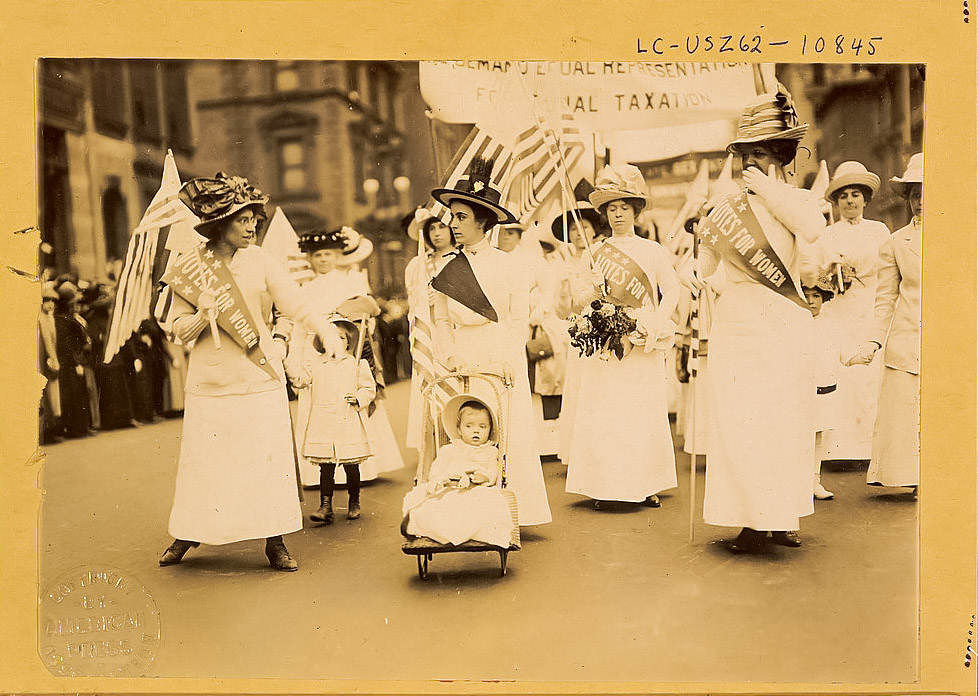Women’s Right To Vote

Women March for Their Right to Vote — 1912
Suffrage Movement Took 100 Years To Unfold in Pre- and Post-Civil War America
The first signs of the quest for gender equality at the polls revealed themselves over 45 years before the Confederate artillery shots fired at Fort Sumter in South Carolina. Those blasts, as history would have it, sparked the Civil War.
While racial issues were at the heart of the fighting that lasted from 1861 to 1965, man-vs.-woman issues were at the heart of the suffrage movement that lasted from 1820 to 1920 and culminated in passing the 19th Amendment.
“The right of the citizens of the United States to vote shall not be denied or abridged by the United States or by any State on account of sex. Congress shall have power to enforce this article by appropriate legislation.”
Those words, as history again would have it, gave half the human race the ability – and the right – to cast a ballot on Election Day.
“By the time the final battle over ratification of the 19th Amendment went down in Nashville, Tennessee in the summer of 1920, 72 years had passed since the first women’s rights convention in Seneca Falls, New York,” according to an article on History.com titled “19th Amendment: A Timeline of the Fight for All Women’s Right to Vote.” “More than 20 nations around the world had granted women the right to vote, along with 15 states, more than half of them in the West. Suffragists had marched en masse, been arrested for illegally voting and picketing outside the White House, gone on hunger strikes and endured brutal beatings in prison – all in the name of the American woman’s right to vote.”
The ratification of the amendment by the Tennessee Legislature occurred via a tie-breaking vote by a state representative who, if it were not for a letter from his mother praising the cause, probably would have voted otherwise.
“For historians and voting rights advocates, the 100th anniversary of the 19th Amendment is an opportunity to reflect on the triumphs – and shortcomings – of the suffrage movement as a whole, as well as the challenges to voting rights that persist to this day,” reads an AARP story titled “Why Women’s Right to Vote Matters 100 Years Later.” “During that time…suffragists not only risked arrest and imprisonment for their activism, but also opposition from the political establishment, the general public (including anti-suffragist women) and industry leaders who feared that voting women would usher in legislation that was bad for business, like a crackdown on child labor.”
The much-deserved and long-awaited victory resulted in sweeping reform.
“More people gained the right to vote with the 19th Amendment than with any other changes we have made to the Constitution or in statutes,” Colleen Shogan, the Women’s Suffrage Centennial Commission’s vice chairwoman, says in the AARP story. “It’s really an incredible moment in American history that many people don’t know too much about, except for maybe a sentence or two.”
The trailblazing suffragettes included Elizabeth Cady Stanton, who helped organize the gathering in Seneca Falls, Lucretia Mott, who advocated against slavery and for women’s rights, Mary Ann McClintock, who with Mott organized the Philadelphia Female Anti-Slavery Society, and Martha Coffin Pelham Wright, Mott’s sister. Jane Hunt, a Quaker activist and an extended member of McClintock’s family, also helped organize the convention.
“The campaign for women’s suffrage began in earnest in the decades before the Civil War. During the 1820s and 30s, most states had extended the franchise to all white men, regardless of how much money or property they had,” states another History.com article on women’s suffrage. “At the same time, all sorts of reform groups were proliferating across the United States – temperance leagues, religious movements, moral-reform societies, anti-slavery organizations – and in many of these, women played a prominent role. Meanwhile, many American women were beginning to chafe against what historians have called the “Cult of True Womanhood”: that is, the idea that the only “true” woman was a pious, submissive wife and mother concerned exclusively with home and family. Put together, all of these contributed to a new way of thinking about what it meant to be a woman and a citizen of the United States.”
That new way of thinking permeates modern society and is evidenced by such things as the Women’s March on Washington and the nomination of Kamala Harris as the first woman of color to run for vice president. With America nearing what is described as the most important election in history, women – and men alike – should rejoice in celebrating such a milestone event.
For information about voting, visit www.vote.org.
Share This


